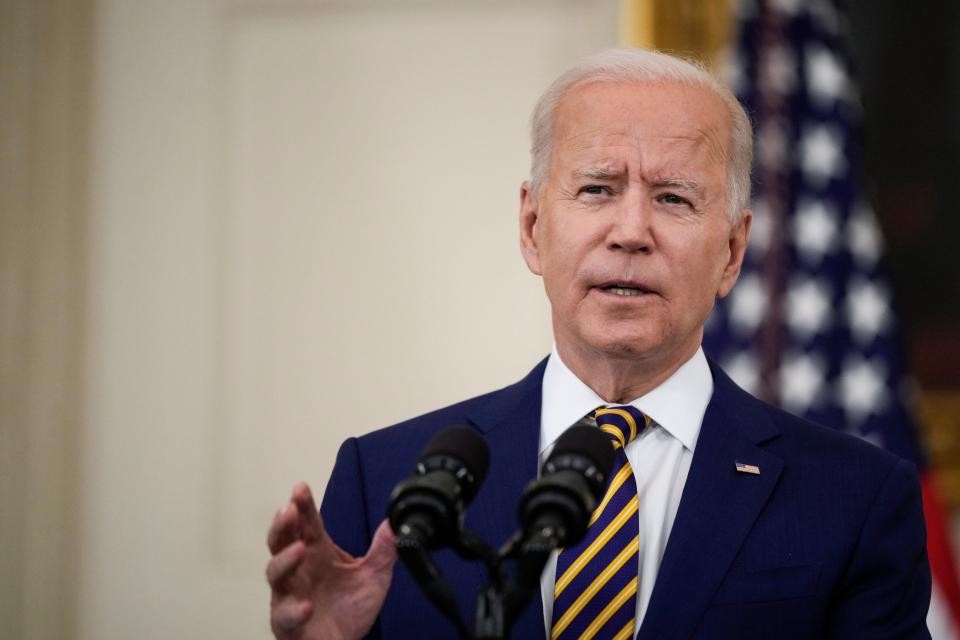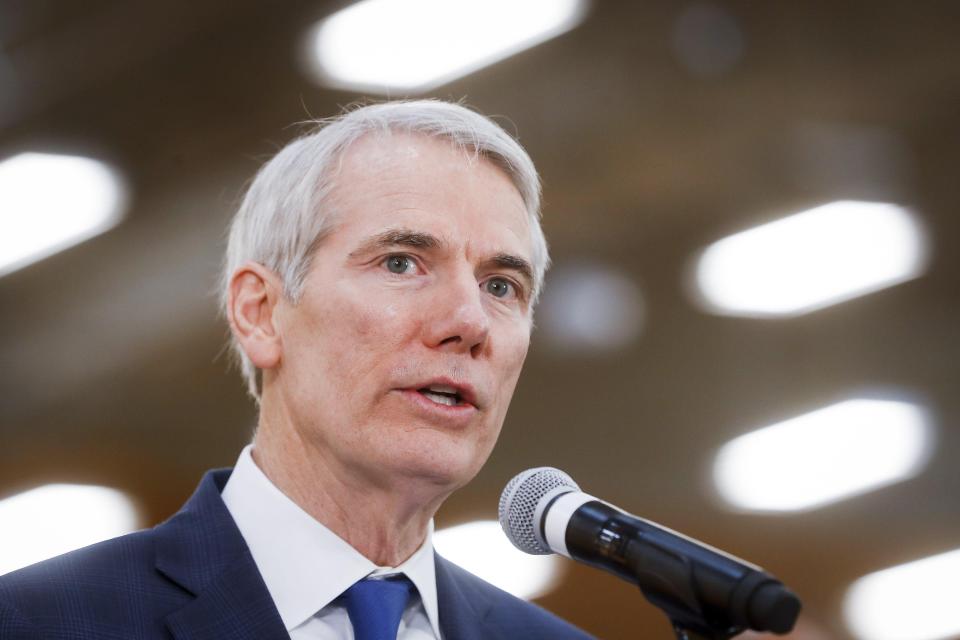White House stands firm against increasing gas tax as Biden, senators prepare to meet on infrastructure
WASHINGTON – President Joe Biden's administration reasserted Monday that it would not support increasing the federal gas tax, a levy on fuel that hasn't been changed since the 1990s, as he and a bipartisan group of senators try to hash out a way to pay for a massive infrastructure plan.
A bipartisan group of 21 senators identified public-private partnerships, redirecting money previously allocated for COVID-19 relief, and "indexing" the federal gas tax annually to match inflation as possible funding options for their $1.2 trillion infrastructure framework, according to a draft outline obtained by USA TODAY.
But the White House, which supports enforcing a minimum tax on corporations to pay for infrastructure, made clear Monday that raising the gas tax is off limits. Several Senate Democrats – including members of the bipartisan group of senators – also have objected.
"The president's pledge was not to raise taxes on Americans making less than $400,000 a year, and the proposed gas tax or vehicle mileage tax would do exactly that," White House press secretary Jen Psaki said Monday, also noting it would raise only $40 billion. "So that is a nonstarter for him."
More: $1.2 trillion bipartisan infrastructure deal gaining steam on Capitol Hill
White House officials and senators were expected to continue infrastructure talks Monday afternoon. Psaki said she expects Biden to host some Senate negotiators at the White House in the coming days. The Senate group's framework proposes $579 billion in new spending on roads, bridges, rail and broadband internet, considerably less than the $1 trillion Biden has sought.

The White House has said it would "take stock" of the status of negotiations with the bipartisan group, which includes 11 Republicans, by the end of this week. Previous negotiations with a separate coalition of six Republican senators collapsed in part because they couldn't agree on how to pay for the bill.
The federal gas tax – 18.4 cents a gallon – has not been changed since 1993. The revenue goes toward highway and transit funding. Republican senators have floated a new surcharge on electric vehicles to pay for infrastructure, but the White House opposes that idea and repurposing COVID-19 rescue money.
More: A new New Deal? How Biden's spending plans stack up to past presidential proposals
Sen. Rob Portman, R-Ohio, one of the lead Republican negotiators in the latest talks, said Sunday on NBC's "Meet the Press" that there are "creative ways" to pay for infrastructure, including indexing the gas tax to inflation.
"But we understand that the administration has very strong views on that," Portman said, making clear Republicans won't support raising taxes on corporations. "The administration therefore will need to come forward with some other ideas without raising taxes. What we don't want to do is hurt the economy right now as we're coming out of this pandemic by raising taxes on working families."
Like Biden, Sen. Jon Tester, D-Mont., one of the 10 Democrat negotiators in the bipartisan group, said he opposes indexing the gas tax even if it's part of the group's framework.
"I certainly don't support the gas tax, and it would have an impact on my support of the bill," Tester said on MSNBC last week. "So hopefully we can remove that gas tax and get another pay-for for that."
More: Democrats prepared to move forward alone while moving ahead with 'two-track' infrastructure plan
When he introduced his $2.25 trillion American Jobs Plan in March, Biden proposed increasing the corporate tax rate from 21% to 28%, which would unwind tax cuts Republicans and former President Donald Trump passed in 2017. In a trimmed-down offer of $1 trillion in new infrastructure spending, Biden agreed to keep the corporate tax rate the same and instead ensure that the largest corporations pay a minimum 15% rate by ending tax loopholes.

Psaki said Monday that beefing up tax enforcement would raise "a great deal more, by multiples" than raising the gas tax and meet Portman's demand that taxes aren't raised.
"And it would fall on predominantly wealthy Americans and just ensure they're paying the taxes that they owe. So that is an area where there should be an opportunity to move forward."
As Biden seeks a bipartisan deal on infrastructure, the White House also supports a two-track strategy led by Senate Majority Leader Chuck Schumer that includes using budget reconciliation, a strategy that bypasses the filibuster process and allows a simple majority to pass legislation in the Democrat-led Senate.
Biden and Democrats hope to use that strategy to pass the president's more ambitious climate-change initiatives and family agendas, including universal prekindergarten, subsidized child care, national paid family leave and free community college.
"We don't see this as a one step," Psaki said. "There's a reconciliation process that's ongoing. And that addresses and includes a number of the president's key priorities."
More: Biden offers to keep 2017 Trump tax cuts intact in infrastructure counteroffer to GOP
Senate Democrats led by Bernie Sanders, I-Vt., chairman of the Senate Budget Committee, have drafted a $6 trillion reconciliation package that combines many of these items.
Yet Psaki did not commit when asked whether Biden would support legislation totaling that dollar figure, pointing to conversations she said need to take place with Congress.
"We're not quite there yet," Psaki said.
Some progressive Democrats have for weeks been ready to move alone via reconciliation without Republicans on infrastructure and forget about a bipartisan deal.
In an interview Sunday on "Meet the Press," Sanders said he would support a narrower bipartisan deal that addresses only physical infrastructure, but not if it includes the gas tax.
"If it is regressive taxation – raising the gas tax or a fee on electric vehicles, or the privatization of infrastructure – no I wouldn’t support it, but we don’t have the details right now."
Contributing: Ledyard King, USA TODAY; The Associated Press. Reach Joey Garrison on Twitter @joeygarrison.
This article originally appeared on USA TODAY: Biden White House against gas tax as infrastructure bill talks drag on

 Yahoo Movies
Yahoo Movies 
